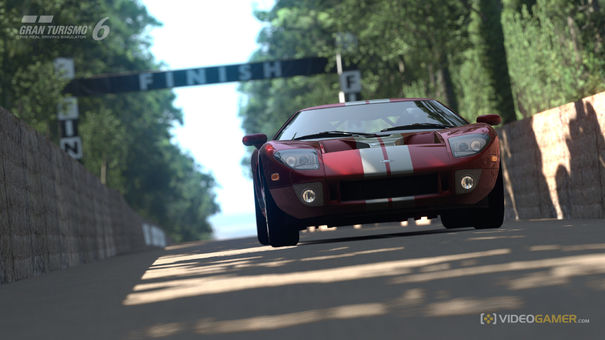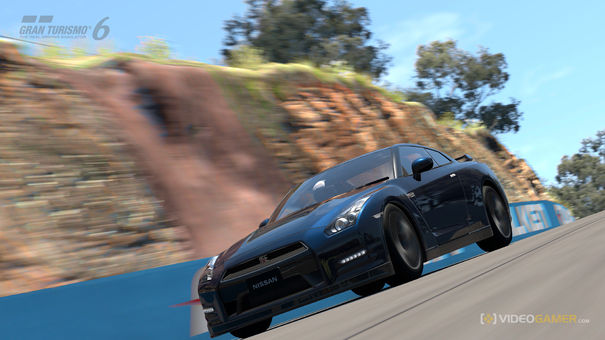



An oft-used defence for Gran Turismo's clinical approach to its on-track action is that "it's a driving game, not a racing game." Yes, it's a pure simulation, bound by the physics of the road – in that sense it's an astounding recreation of authenticity. But it is, by its very structure, a racer. You win stars depending on your position in races and challenges, which then advance you to the next stages with faster and more impressive cars.
You progress by competing, and yet there's no punishment for dangerous or unruly driving. You can cut corners, shunt other drivers, and flip your car hundreds of times without receiving a single dent or mechanical issue. Aside from the clear precision at work within the handling model, Gran Turismo 6 never seems to care that much about driving.
The only time you're really assessed on your skill behind the wheel is in the new and improved licence tests. And even though they've been streamlined and made less dull than in previous entries, they're hardly enough to warrant an entire game by themselves. GT6 is a racing title, and it rarely strikes the levels of excitement it needs to in order to succeed.
Nowhere is this more apparent than in the early stages. You're constrained to road vehicles you're likely able to acquire and drive in reality. It passes time to experiment with them all, but you have very few in-game credits to play around with. These early races give you the first glimpse of the aforementioned great handling, but also the barriers that are put up for anyone looking to access the impressive variety Polyphony has stuffed the game with.
Even once you have a couple of vehicles to swap between, GT doesn't make it easy to access new events. The specifications for each championship are numerous, and instead of simply offering up a list of eligible rides for you to buy and get on with things, Polyphony make every attempt to keep you in the menus, sifting through hundreds of Mazdas until you've found one appropriate for the set of events you want to enter. It's muddled and truly irritating.
While Gran Turismo continuously impresses with its track count and variety of its disciplines – something no other racer has managed to achieve – it never manages to make said racing particularly fun. You'll instantly notice differences between marques – a high torque Impreza will have a nuance that's entirely disparate from a sleek Aston Martin, for example. The suspension model is great, and you'll find that you have to adjust your braking and accelerating habits according to what's in your garage. The vehicles visibly react under strain, and in replays it looks marvellous.
Some will respond nicely to tight turns, allowing for a precise weaving through strings of long corners and tight hairpins, whereas other, bulkier beasts – especially the classic muscle variety – require more care and patience in order to guarantee a decent line. You'll also learn to measure distances. The naturally sporty Ferraris and the track-focused McLaren have responsive braking – decelerate too aggressively and you'll lose control – whereas a standard Renault at full speed requires a fair bit of track to slow down enough to hit an apex just right.
Going even deeper into the mechanics, every single car has differing response times, so it'll take dozens of races until you feel that you've mastered certain behaviours. This is excellent for experts, but it may be frustrating for the less hardcore. There are also a massive number of different race types, from traditional circuits like Spa, Silverstone and Suzuka, to rally events in the snow and sand, Indy races on oval circuits, karting events in tight indoor arenas, and even a recreation of the Goodwood Festival of Speed. But despite the huge span of competition on offer, using a controller offers very little feedback to how you're performing. Despite the purists' cries of anger that you should use a force feedback wheel – until Gran Turismo 6 comes packed with a wheel as standard, it's not too much to expect that a racer to perform well with traditional methods of control.
Buying a new car – once you've managed to accrue the currency – is exciting, but the journey to get to that point is far too long. It's satisfying to explore the handling – finally getting my hands on a Ferrari was exhilarating – but your opponents never change, and Polyphony never seems to ask much of you. You're often found trundling around on your own in a soulless arena of nothingness. It's an exclusionary experience that never wants to share in the thrill of the competition.

When compared to Forza 5 – the other top-tier simulation racer of the season – Gran Turismo 6's sheer amount of tracks is impressive. With dozens of real world courses and original designs from the Gran Turismo team, (one is set on the moon) it's a constant series of discoveries as you venture around new circuits in different times of day, and with completely different weather conditions. It's a marvellous selection, and despite not looking as good as Xbox One's launch title, is definitely Gran Turismo 6's greatest strength.
But its car roster suffers from constant peaks and troughs. A number of its automobiles are beautifully rendered 'premium' models, complete with fully recreated interiors. They don't look as good as you may expect, and the PS3 is showing its age, but they're good nonetheless. Meanwhile, a large percentage of the garage is poorly modelled, without the quality of their premium cousins. They even have silhouette cockpits, which is just shoddy. Considering Forza 5 has a car count of 200, but every single one is gorgeously crafted, it makes you question why the developer leaves such low quality vehicles in a title that claims to adore motorsport. It does them a true disservice.
The most controversial point about Gran Turismo 6 also does it no favours. Microtransactions are almost par for the course nowadays, but the way GT6 handles them in its career mode is unacceptable. In previous instalments, you would receive prize vehicles as you complete events. While this is still the case when you win licence tests and other special events, it's far, far less frequent than before. You're therefore left with far fewer prizes in your garage as you progress through the bevy of events.
This wouldn't be a problem if the developers were more generous with monetary payouts, but the prize winnings don't feel substantial enough anymore. You're left with what is essentially less money coming in as you win races, leaving you unable to capitalize on offers in the marketplace. This in turn results in a clear push to buy vehicles using your hard-earned real cash.
When some of these motors would cost upwards of £120 using real money, it's a true disgrace that players are forced into feeling that they must grind towards a luxurious garage of wonderful motorcars in order to avoid the alternative – spend more. Of course it's possible to work your way through the ranks in order to buy your favourite automobiles, but the attached expense, in terms of your actual time, is painful. After a fair few hours of play, we had just five cars in our garage and 80,000 credits in our bank – just enough to buy a '08 BMW Z4. This quintuplet wasn't impressive either – a 2006 Honda S2000 is hardly going to set the grandstands alight, is it?
Even the online events, most of which are comprehensively focused on providing a great time with friends and online competitors, often nudge you to consider buying with real cash. It's never forceful, but it's a true shame that it's there at all.
Despite the online balance between fun race modes, competition and even completely free-roam racing, where you can just drive around with mates enjoying the road, the same limitations to the single-player apply in multi. There's a lot of customisation on offer, and it's possible to tweak your own races, but if you're entering unrestricted races you should expect to meet some unbeatable competition with racers in much faster vehicles – unless you've put in the many hours to earn your own. With the absence of computerized AI, the online portion of GT6 is a better avenue for players looking for serious, thrilling competition, but even then the overarching microtransactions vibe often feels intrusive to the experience.
Seasonal Events – the multiplayer's online time-limited challenges – also have very specific requirements for entry. If you're left looking at an event with just a day left on the clock, but you're short of the funds necessary to buy the Audi required for entry, it's tempting to buy credits. It shouldn't be, but it's a long slog to earn the currency needed to drop money on one single car.
Gran Turismo 6 is a racing game. Its driving is precise and excellently recreated, with the most varied and impressive array of tracks ever assembled on one disc, but its racing is truly lacking. Playing the traditional way, it's never an excitement to compete with anyone but yourself. The irritating menus, slow-to-progress career and the constant pull of microtransactions make Gran Turismo 6 feel tainted. It's a true disappointment that a series that proudly claims to love cars feels more interested with the price tag associated with them.




 Call of Duty: Advanced Warfare multiplayer guide – Exo basics
Call of Duty: Advanced Warfare multiplayer guide – Exo basics Walkthrough Just Cause 3
Walkthrough Just Cause 3 28 Great Skyrim Mods That Won't Break Your Game
28 Great Skyrim Mods That Won't Break Your Game Pokemon X & Y Type Chart - GamersHeroes
Pokemon X & Y Type Chart - GamersHeroes GTA 5: How The Characters and Missions Raise The Bar
GTA 5: How The Characters and Missions Raise The Bar